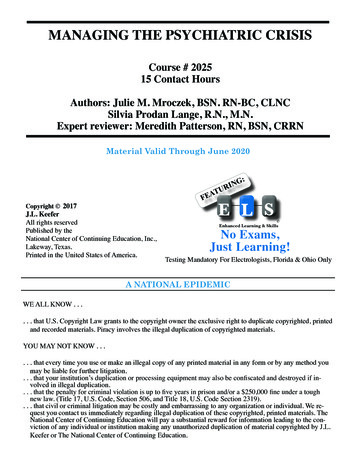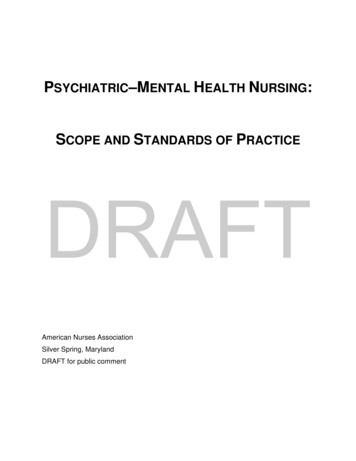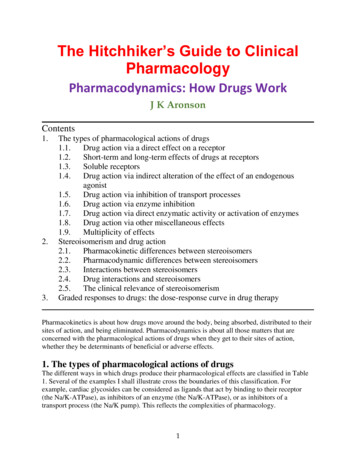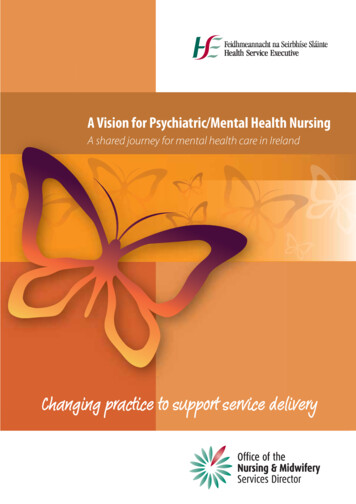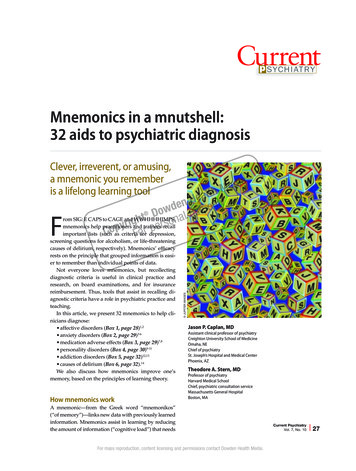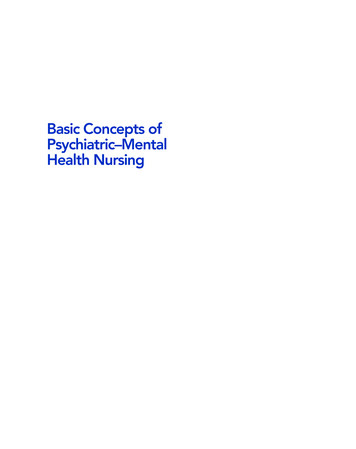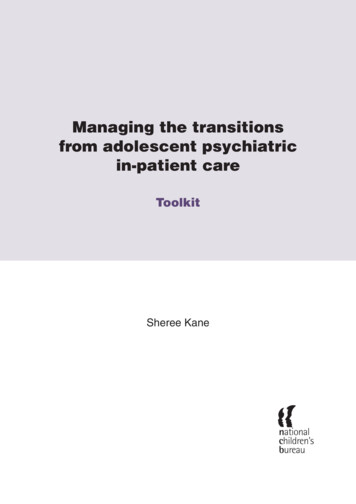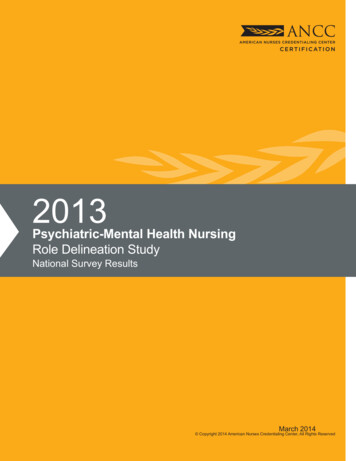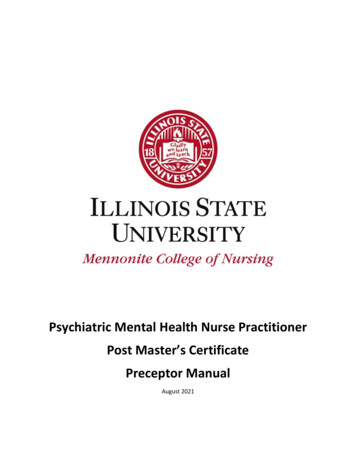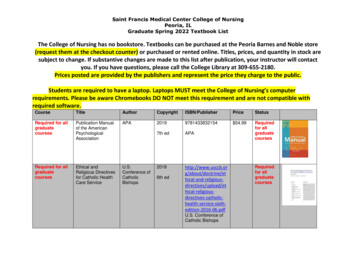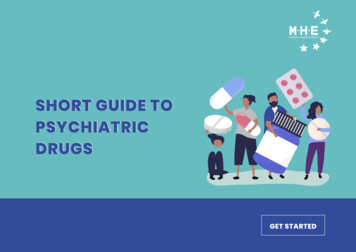
Transcription
SHORT GUIDE TOPSYCHIATRICDRUGSGET STARTED
WELCOME!
INTRODUCTIONThis guide is the third publication in our series of short guides. A ‘Short Guide to Psychiatric Drugs’ follows onfrom ‘A Guide to Personal Recovery in Mental Health’ and ‘A Short Guide to Psychiatric Diagnosis’. This latest‘Short Guide to Psychiatric Drugs’ was created for people taking medication. It aims to help people who usemental health services and those closest to them understand and become more active in managing theirtreatment.Most people who experience mental distress consult a doctor or a therapist. The information below assumesthat the consultation should be a dialogue in which the person and the physician jointly explore what willhelp alleviate the distress and review the successes and failures of the plan at regular intervals.This guide deals with the subject of drugs commonly prescribed by psychiatristsand other medical professionals. It explores the different types of psychiatricdrugs, their effects and what to keep in mind when you start or stop taking them.The guide does not provide medical advice. It is intended for informationalpurposes only.A Short Guide to Psychiatric DrugsPage 3
1. WHAT ARE PSYCHIATRIC DRUGS?Psychiatric drugs are substancescapable of affecting the mind,emotions and behaviour. They canalter the way we think, feel and seethe world. Some of their effects areexperienced as beneficial; producinga temporary sense of calm orwellbeing that may be preferableto the previous state of distress oragitation.Additionally, the adaptations madeby the body to deal with the changesproduced by the drug can also meanthat stopping taking it can produceunpleasant effects that last for a longtime, sometimes forever. Psychiatricdrugs are best understood as toolsthat may, or may not, be helpful topersons at particular points in theirlives.BEGINNING A COURSE OFPSYCHIATRIC DRUGS IS THEREFORENOT A DECISION TO BE TAKENLIGHTLY AND ONE ABOUT WHICHBOTH DOCTOR AND CLIENT NEED TOBE FULLY INFORMED.On the other hand, as with all drugsthat act on the chemistry of the brain,there can be other less desirableeffects that are unpleasant, impairfunctioning and can endangergeneral health.A Short Guide to Psychiatric DrugsPage 4
2. WHAT ARE THE DIFFERENT TYPESOF PSYCHIATRIC DRUGS?The information below is based on chapter 4 of aGuidance for Psychological Therapists: Enablingconversations with clients taking or withdrawingfrom prescribed psychiatric drugs.ANTIDEPRESSANTSThese are the most commonly prescribedpsychiatric drugs, and their use continues to riseand diversify.We invite those interested in research into theeffects of specific classes of drugs to read thischapter for themselves.BENZODIAZEPINES AND RELATED DRUGSBenzodiazepines were a class of drugs discoveredin the 1960s known as (minor) tranquillisers. Theyare commonly prescribed for anxiety or insomnia.IF YOU ARE BEING PRESCRIBED APARTICULAR DRUG, IT IS IMPORTANTTO FIND OUT AS MUCH AS YOU CANABOUT IT FROM YOUR DOCTOR ANDOTHER RELIABLE SOURCES.A Short Guide to Psychiatric DrugsStarting in the late 1980s, the Z-drugs (zopiclone,zolpidem and zaleplon) were introduced. Theseare chemically different from benzodiazepines buthave similar effects and are now widely prescribedfor insomnia.Page 5
2. WHAT ARE THE DIFFERENT TYPES OF PSYCHIATRIC DRUGS?ANTI-PSYCHOTICSThe types of drugs that are nowcommonly called ‘anti-psychotics’were previously referred toas neuroleptics or as majortranquillisers.Antipsychotic medication is amainstay of treatment for peoplediagnosed with psychosis andschizophrenia. They are used totreat acute episodes of psychoticdisturbance; they are also used in arange of other situations, particularlyto calm and subdue people who areagitated or aggressive.A Short Guide to Psychiatric DrugsLITHIUM AND OTHER DRUGSREFERRED TO AS MOODSTABILISERSDrugs labelled as ‘mood stabilisers’refer to drugs that have beenlicensed for, or are commonlyused in, the treatment of peoplediagnosed with bipolar disorder ormanic depression.Although the idea of a ‘moodstabiliser’ implies specific effects onthe underlying biological basis ofmood variability, this still needs to bedemonstrated scientifically.STIMULANTSStimulants are a group of drugsthat are still referred to by thetype of effect they induce, ratherthan the condition for whichthey are prescribed. They arecontrolled drugs, and some, suchas amphetamines and cocaine, arecommonly used recreationally.Stimulants are today mainlyprescribed for what is referred toas ‘attention deficit hyperactivitydisorder’ (or ADHD) – namely, a setof behavioural problems deemed tooccur in children and increasingly inadults.Page 6
3. HOW DO PSYCHIATRIC DRUGS WORK?Over the years in which psychiatricdrugs have been used, the idea hasarisen (and been promoted) thatmental distress is caused by flaws orimbalances in the brain and that thedrugs correct or rectify this imbalance.This narrative is part of a bio-medicalor “disease” model which treatsmental distress in the same way as aphysical illness.Despite years and years of researchinto the biological causes of mentaldistress, no one has yet foundconsistent abnormalities or markerswhich reliably predict or identifymental ill-health. This calls intoquestion the whole idea of mentaldistress being caused by biologicalmalfunctioning.A Short Guide to Psychiatric DrugsIN THE ABSENCE OF ANY BIOLOGICALABNORMALITIES, IT IS INACCURATEAND POTENTIALLY MISLEADING TOTALK ABOUT DRUGS AS CORRECTINGOR RESTORING THE CHEMICALBALANCES WITHIN THE BODY.None of this means that the effectsof psychiatric drugs cannot beexperienced as beneficial or asbringing relief from painful emotionsor disturbances of thought. It does,however, point to the need to weighup the benefits and costs of theireffects very carefully and in particularthe long-term implications ofcontinuing use.Page 7
4. WHAT IF PSYCHIATRIC DRUGS AREBEING PRESCRIBED FOR THE FIRST TIME?EMBARKING ON A COURSE OF DRUGS THAT MAYHAVE LASTING EFFECTS ON THE BRAIN IS A BIGDECISION, AND VERY OFTEN, PEOPLE ARE NOTIN A STATE TO APPROACH THAT DECISION WITHHowever, the consequences of what happens on thisfirst occasion of taking a course of psychiatric drugsmay last a lifetime, so someone’s support in finding outwhat these consequences might be is crucial at thisstage.DUE CARE AND ATTENTION.If this is the case, find someone you trust – a friend orrelative – to support you in asking the right questionsand doing the necessary research.This is not necessarily straightforward, because peoplemostly rely on doctors’ advice, and if you are in adistressed state, your friends and relatives may just berelieved that you are getting help.A Short Guide to Psychiatric DrugsPage 8
These are the kind of questions that could be asked:[ ] WHAT SORT OF EFFECTS SHOULD I EXPERIENCEFROM THIS DRUG?[ ] WHAT SHOULD BE THE POSITIVE EFFECTS?[ ] WHAT MIGHT BE THE NEGATIVE OR UNPLEASANTEXPERIENCES?[ ] WHAT ARE THE RISKS TO HEALTH ANDOf course, the answers to some of these questionscan be found on the internet, but it is important tocheck that your sources are reliable because thereis a lot of misinformation there too.There are links to some reliable publications andsites at the end of this guide. However, none of thistype of research is a substitute for talking to thedoctor doing the prescribing who is responsible foryour healthcare.FUNCTIONING KNOWN TO BE ASSOCIATED WITH THISDRUG?[ ] HOW LONG SHOULD I BE ON THIS COURSE OFDRUGS?IF YOU ARE UNABLE TO TALK OPENLY WITHYOUR DOCTOR AND FEEL YOUCANNOT TRUST WHAT YOU ARE[ ] WHAT IF I FIND THE EFFECTS EITHER UNHELPFULBEING TOLD, THEN IT IS TIMEOR WORSE THAN THE ORIGINAL DISTRESSING MENTALTO START LOOKING FOR ASTATE?DOCTOR WHOM YOU CAN TRUST.[ ] IF FOR ANY REASON I DECIDE TO END THIS COURSEDRUGS, WILL YOU HELP ME TO DO THIS SAFELY?A Short Guide to Psychiatric DrugsPage 9
5. WHAT IF I HAVE BEEN TAKINGPSYCHIATRIC DRUGS FOR A WHILE?Many people are prescribed psychiatric drugs overmany years, even for the rest of their lives. Where thereis a reason given for this, it is usually described as a“maintenance dose” to prevent relapse.companies tend not to fund such longitudinalresearch and, in the case of newer drugs, they maysimply not have been around long enough for thenegative consequences to appear.If you are experiencing only beneficial effects andthere are no negative effects on your daily life or yourgeneral health, then this rationale is not a problem,and you probably need only to be alert to some of thewell-known, long-term issues associated with the drug.However, compared with studies of the immediateimpact of drugs, there are very few looking at thelonger term. This is partly because pharmaceuticalA Short Guide to Psychiatric DrugsPage 10
5. WHAT IF I HAVE BEEN TAKING PSYCHIATRIC DRUGS FOR A WHILE?Here are some of the things to lookout for:The body becominghabituated to the drug and itlosing its effectiveness;Experiencing a mental statethat makes normal dailylife difficult, such as feelingemotionally blunted and flat,being unable to concentrate ordo simple mental tasks as wellas before, or feeling agitatedand unable to settle down to atask;Noticing physical changes tothe body which impair functionsuch as involuntary movement(shakes), weight gain, musclepain, loss of energy, nausea orsexual malfunction.A Short Guide to Psychiatric DrugsIf you are concerned about any ofthese, you should ask for a reviewin which you discuss the balance ofharms and benefits of the drug.However, if you are thinking ofdiscontinuing a course of psychiatricdrugs, there are some things it isvitally important for you to know anddiscuss with your doctor:Most drugs prescribed foralleviating mental distress createchemical dependency – they alterthe functioning of the brain andbody in ways that take time toreadjust to if the drug is stopped.Most adults are aware of this effectin relation to say alcohol, nicotineor cocaine, but it is exactly thesame with prescribed drugs. Eachdrug acts differently in this respecttaking a longer or shorter time forthe drug to clear the system andfor the body and brain to readjust;For many drugs, one of the wellknown consequences of stoppingtaking them is a return to thesame distressing “symptoms” forwhich they were prescribed butin heightened form. This can bemisdiagnosed as a relapse orrecurrence of the original episode.IT IS THEREFORE IMPORTANT FORWITHDRAWAL FROM PSYCHIATRICDRUGS TO BE UNDERTAKENGRADUALLY AND BE SUPERVISEDAND SUPPORTED BY SOMEONEWHO UNDERSTANDS THEEFFECTS AND BEHAVIOUR OF THEPARTICULAR DRUG.Page 11
6. FINDING SUPPORT IN REDUCING ORCOMING OFF PSYCHIATRIC DRUGSThe decision to cease taking psychiatric drugsshould be made by the person for whom they arebeing prescribed – as with other forms of medicalintervention.If, having weighed up the pros and cons, you havedecided to reduce or terminate your prescription,it is important to recognise that this could bedifficult and that it cannot be done withoutsupport from someone who knows what they aredoing.If your relationship with the doctor who prescribedthem is good, you might want to explore andresearch withdrawal together.A Short Guide to Psychiatric DrugsIt may also be necessary to reassure friendsand family that your decision is being made infull knowledge of the effects and consequences.Stopping a form of medical treatment thateveryone has been told is essential to yourmental wellbeing can seem perverse andhazardous.IT IS DIFFICULT TO GIVE ADVICE IN THISAREA THAT SUITS EVERYBODY, BECAUSEOUR CIRCUMSTANCES AND THE REASONSFOR TAKING PSYCHIATRIC DRUGS AREALWAYS VERY DIFFERENT.Page 12
6. FINDING SUPPORT IN REDUCING OR COMING OFF PSYCHIATRIC DRUGSOur physical health and our individual biologicalresponse to the drugs can vary hugely from oneperson to the next, and each person is also likelyto have taken a slightly different combination ofdrugs, at different doses, for a different length oftime.Even with expert pharmacological support, thereare other kinds of expertise that can be veryhelpful – notably learning from the experiencesof others who have gone on the same journey.Below are some resources that you may findhelpful.IT IS IMPORTANT TO TALK TO YOURDOCTOR (PREFERABLY THE DOCTOR WHOPRESCRIBED THE DRUGS IN THE FIRSTPLACE) TO PLAN A SAFE WAY TO COMEOFF.The general advice is to take it very slowly. Rapidchanges in powerful medication that affects thechemistry of the brain can be unpleasant or evenrisky. So, take it slowly, and take advice.A Short Guide to Psychiatric DrugsPage 13
REFERENCES AND RESOURCESBOOKSComing off Psychiatric Drugs: SuccessfulWithdrawal from Neuroleptics,Antidepressants, Mood Stabilizers, Ritalin andTranquilizers. Peter Lehmann (Ed) Latest editionavailable as an ebook from drawebook.htmContains research findings and accounts bypeople with lived experience of using andwithdrawing from different psychiatric drugs.An article outlining the contents of this bookis available from hmann/pdf/comingoff 3-37.pdfA Short Guide to Psychiatric DrugsMoncrieff, J., & Stockmann, T. (2019). Whatpsychiatric drugs do by class. In: A. Guy, J.Davies, R. Rizq (Eds.) Guidance for PsychologicalTherapists: Enabling conversations with clientstaking or withdrawing from prescribed psychiatricdrugs. London: APPG for Prescribed DrugDependence. Available gical-therapists/Page 14
PAMPHLETMaking sense of psychiatric medicationpublished by MIND in the UK. Available s-and-treatments/medication/aboutmedication/ Sound factual information andgeneral advice.FILMComing Off Psych Drugs: A Meeting of theMinds (on coming off psychiatric medication)by Daniel Mackler https://www.youtube.com/watch?v Q5EpnVdLvkU75 mins. First-hand accounts of the experienceof coming off psychiatric drugs. A group ofusers, ex-users and survivors of psychiatrymeet for 3 days for training to discuss the issuesand to share their stories. Made in the USAand available on YouTube with subtitles in 9languages.A Short Guide to Psychiatric DrugsTALKSPsych-Drugs Risks and Alternatives 4 - RobertWhitaker - October 15, 2016. Available at: https://www.youtube.com/watch?v 3-nWj23SKC8 Ascientific overview of the reasons why we needto stop prescribing and help people to comeoff psychiatric drugs by a Pulitzer prize-winningjournalist who has been researching this issuefor the past 20 years.Psych-Drugs Risks and Alternatives 5 - WillHall - “Harm Reduction” - October 5, 2016.Available at: https://www.youtube.com/watch?v 0JmvGuGc17E Will Hall is a therapist,teacher and survivor of a diagnosis ofschizophrenia who pioneered what has becomeknown as the “harm reduction” approach tocoming off psychiatric drugs.Page 15
We hope that this shortguide provides youwith information tounderstand and becomemore active in managingyour treatment.
ABOUT MENTAL HEALTH EUROPE (MHE)With 70 organisations in 30 countries, MHE is the largestindependent network working to advocate for positive mentalhealth and wellbeing and to protect the rights of people withmental ill-health. We continuously champion social inclusion,deinstitutionalisation and respect for the human rights of peoplewith psychosocial disabilities. We raise awareness to end mentalhealth stigma throughout Europe.For more information, please heuropemhesmeThe work of Mental Health Europe is supported by the European Commission through the Rights, Equality andCitizenship Programme. The information contained in this document does not necessarily reflect the positionor opinion of the European Commission.The work of Mental Health Europe is supported in part by a grant from the Foundations Open Society Institute in cooperationwith the Public Health Program of the Open Society Foundations.
readjust to if the drug is stopped. Most adults are aware of this effect in relation to say alcohol, nicotine or cocaine, but it is exactly the same with prescribed drugs. Each drug acts differently in this respect taking a longer or shorter time for the drug to clear the system and for the body and brain to readjust; For many drugs, one of the .
